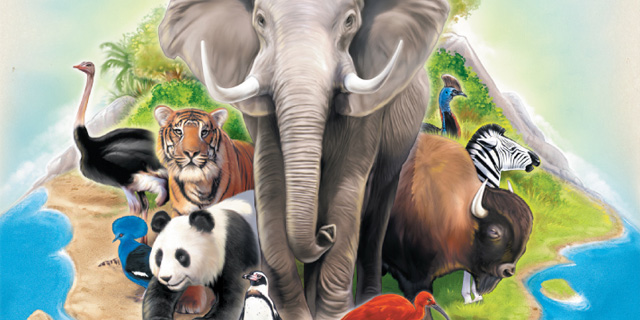
Last year I covered Factory Fun, a puzzle-style game that forced players to connect pieces drawn from a central pool. Mondo, designed by Michael Schacht ( Zooloretto, Web of Power/China) and published by Z-Man Games, takes that same style of gameplay and removes the round-based structure and math to create a simpler, more frantic experience. Mondo is also incredibly quick to play, with a full three-round game taking less than half an hour.
Each player (up to four) receives an empty island board: one side is completely surrounded by water, while the other side has borders of all four terrain types found in the game (grassland, forest, and desert in addition to water). The water side is the easier side, but all players should agree on which side they’re using. The 136 double-sided terrain tiles are placed in a central pile, the timer is set to seven minutes, and the race is on! The first tile placed can be put anywhere on your island, but all subsequent tiles must be adjacent to at least one other tile. Each tile has a single terrain type on one side and either two or three on the other (except for some water tiles); placing tiles in such a way as to make natural borders (with specific exceptions, all terrain splits are diagonal) will earn you points, as will using tiles depicting various animals. Bonus points for completing your island before time is up (and faster than other players) are also available, as are penalties for active volcanoes, empty spaces, and incorrect borders.

In the basic game, that’s it. And you can easily have a blast with just three rounds of these basic rules. However, there are two further levels of complexity (aside from the side of the board used) if you wan them. The advanced level introduces a scoring modifier along with its six-minute timer, a global challenge issued to all players. This is usually terrain-based, such as having the largest completed forest or having the most completed terrains. Whoever wins this award earns four bonus points, and whoever does the worst at it loses four.
A new challenge is used each round. Expert players have only five minutes and face an additional complication of tasks. Two tasks per player are revealed at the start of the round, which indicate specific goals to achieve. like “a completed grassland containing at least three elephants,” “all four sea animals present” or “no incorrect borders.” Both the challenges and tasks are represented in purely graphical terms, so no reading is required once you know what they mean. After placing at least three tiles, a player may claim up to two tasks that will score (or penalize) only you.

Regardless of what difficulty is played, the main problem is that all players are competing for the same tiles, and there are only so many available in specific combinations (including several that are unique). The fact that these often-crucial tiles can be easily “buried” on another player’s island (especially if they’re using the one-terrain flip side of it) will cost you dearly if you find yourself needing them. Also potentially costly are the active volcanoes, which almost always appear on tiles you really want (or need) to use. Only the player with the most volcanoes in a given round gets penalized for having them (to the tune of one point each), although the leader after rounds one and two gets to treat any inactive volcanoes as active for the purposes of determining who has the most. I seem to have a blind spot when it comes to volcanoes, so I usually end up being crushed by them every time I play. Fortunately, that doesn’t impact my enjoyment of this brain-burning little game in the slightest.
Mondo retails for around $30 and is suitable for players of age eight and up, although the basic game can probably be enjoyed by any kids young enough to not eat the tiles as long as someone can do the scoring for them.



















